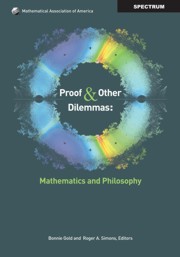Book contents
II - Social Constructivist Views of Mathematics
Summary
Two completely new philosophies of mathematics have been developed since 1950: structuralism and social constructivism. Structuralism is the view that mathematics is the science of structures, or patterns. That view is discussed in several of the chapters in section 3. Social constructivism has been developed primarily by mathematicians, although one can trace its origins to some discussion by philosophers such as Lakatos. Social constructivism is the view that mathematics is constructed by the community of mathematicians. In one sense, this is so obviously true that there is no need to discuss it further. Certainly, human knowledge of mathematics is developed by the community of mathematicians. However, as we discover mathematical facts, it feels to most of us as if there is an objective reality out there, within which these facts are either true or false. It certainly does not seem that the bunch of us can just one day decide, “the Riemann hypothesis is true,” and it will be so. On the other hand, when a new mathematical concept is introduced and developed, things are less clear. Is there some external “natural” concept that we're grasping for? Or are we just making it up, albeit with some restrictions related to the questions we are developing it to investigate? The less extreme versions of social constructivism, represented in this volume, suggest that, once the community has developed a mathematical concept, the facts about this concept are indeed objective. However, there are philosophical issues with this viewpoint, and these are also discussed in this section.
- Type
- Chapter
- Information
- Proof and Other DilemmasMathematics and Philosophy, pp. 79 - 80Publisher: Mathematical Association of AmericaPrint publication year: 2008



